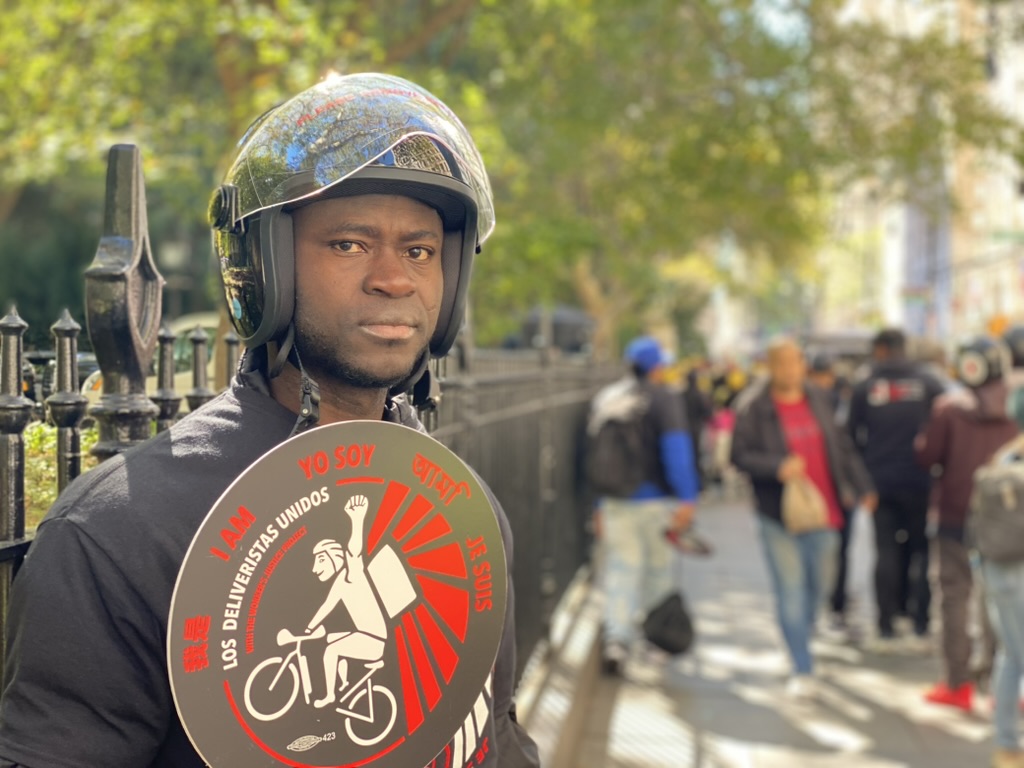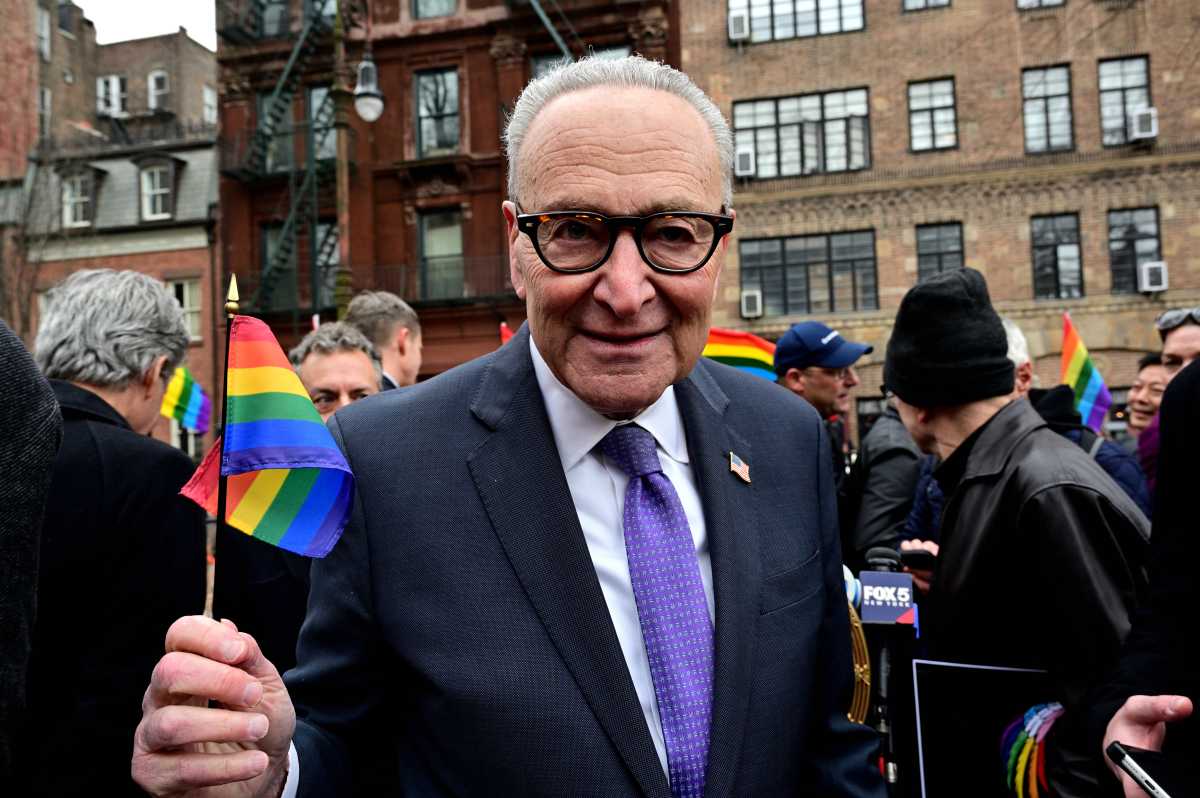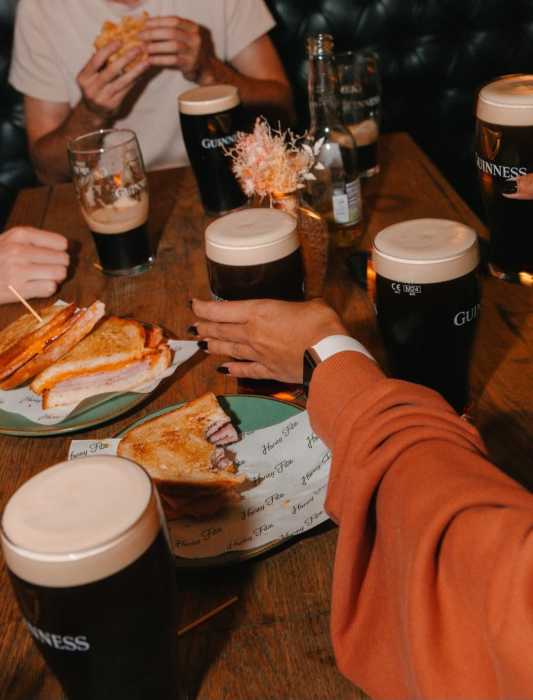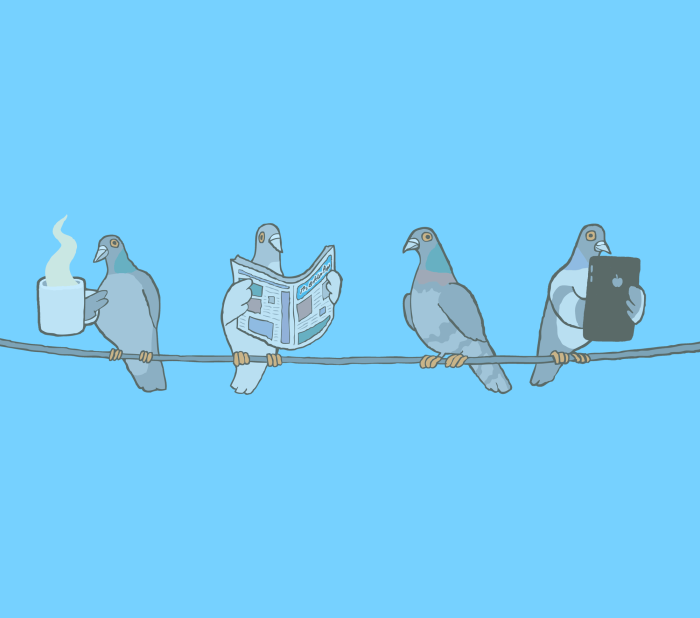Since March, Cossi Azonwakon has been trying to get his Grubhub account reinstated after he was abruptly locked out of the app, he says, because he took too long with a delivery.
Azonwakon, who began delivering for Grubhub in 2019 after moving to New York from Benin, West Africa, in 2017, says the deactivation after six years with the food delivery company has left him struggling financially.
“Since they deactivated my account, I keep looking for another job, but it’s not easy,” Azonwakon said in an interview on Thursday. “I use only Grubhub to work. Now I can’t pay my rent or take care of my family.”
Azonwakon said his account was closed after the company accused him of fraudulently trying to increase his minimum pay. He believes the real issue was delays beyond his control, such as traffic, restaurant wait times, and building access, and that the company prefers to deactivate workers whose deliveries take longer rather than addressing systemic issues.
“Sometimes the order is not ready, or traffic is bad, or you have to use a service entrance,” he said. “All this makes delivery longer. It’s not our fault. These companies blame us for anything that can affect their profit.”
Azonwakon said he has filed monthly appeals since March but has received only rejections. “They say they can’t open my account because there are more drivers in the city,” he said. “I just want my app back so I can start work.”
He is one of a thousand deliveristas who have appealed deactivations with major food-delivery companies in recent months, according to Workers’ Justice Project/Los Deliveristas Unidos.
Over 25 of them joined Thursday’s rally in Lower Manhattan, calling on the City Council to pass Intro. 1332, a bill that would bar app-based companies from deactivating couriers without just cause or notice, what they call algorithmic firings.
“We can no longer rely on the goodwill of the companies to ensure that workers get justice,” said Ligia Guallpa, executive director of Workers’ Justice Project. “In the last four months alone, our organization has filed over a thousand deactivation appeals with Grubhub, DoorDash, and Uber. These companies have ignored them. That’s why we’re fighting for this lifeline bill to ensure job security and street safety.”
She said the apps are pressuring workers to deliver faster and faster, “making our streets unsafe, making this job one of the deadliest jobs in our city, but also exploiting workers.”
Workers’ Justice Project and Los Deliveristas Unidos say app delivery companies have “outsourced” their termination processes to AI – “algorithmic management” programs they say “ruthlessly” fire workers set up against “impossible deadlines.”
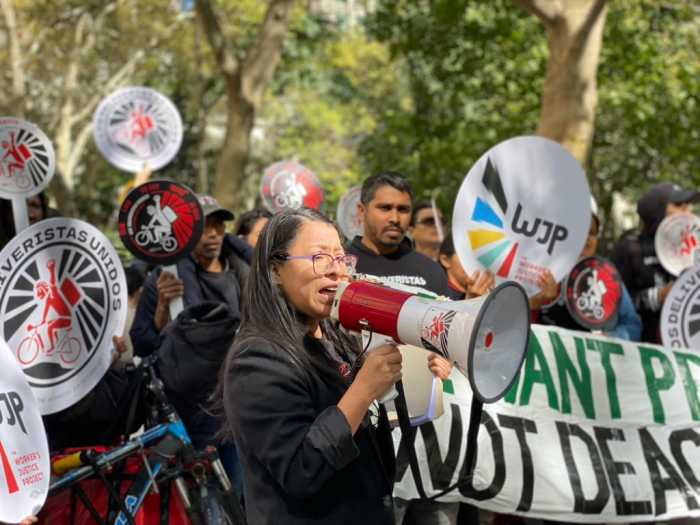
At the rally, delivery workers from DoorDash, Uber Eats, and Grubhub shared similar accounts of losing their jobs without explanation.
“I worked for Grubhub for over four years,” one worker by the name of Shahadat said. “They deactivated my account for no reason. I work in bad weather, at night, and they said my photo wasn’t clear. It’s ridiculous — so many of my friends lost their accounts for the same reason.”
Another speaker, Demusa, who drives for Uber Eats, said he was accused of “fraud” without proof and was locked out of his account overnight.
“They treat us like we’re not human,” he said. “We call for explanations, and they refuse to give any.”
José Lino Yos, a leader with Los Deliveristas Unidos, said every deactivation destroys a worker’s livelihood, and that Intro 1332 is about dignity as much as fairness.
“Every unjust deactivation destroys the life of a delivery worker and their family,” Yos said. “We lose safety, stability, and dignity. But today we say enough.”
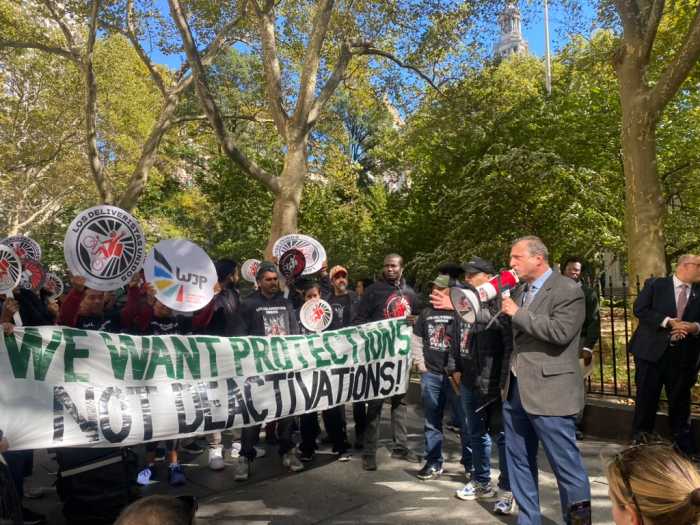
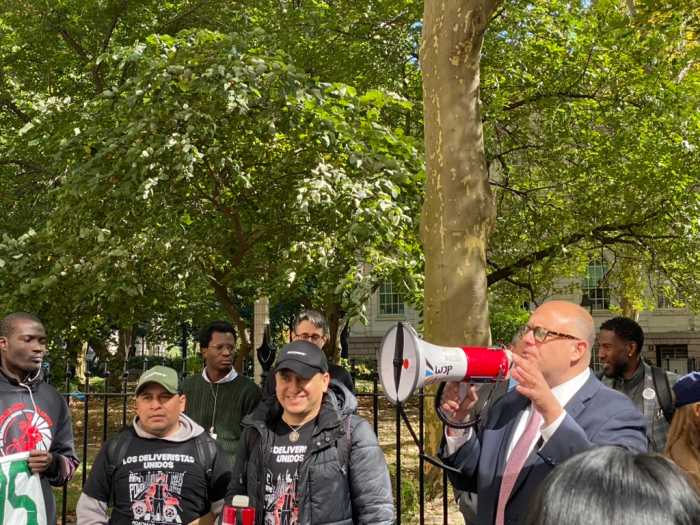
Brooklyn Council Member Justin Brannan, who introduced the bill, told workers at the rally that the city would stand with them.
“These billion-dollar app companies are billion-dollar app companies because of the men and women like you, the hard-working people that keep these apps going, and if an algorithm can fire you today for no reason, who’s to say that that algorithm can’t fire all of us tomorrow?” Brannan said.
He pledged to the workers that the City Council would support them and pass legislation to “make sure that the human beings behind this technology, that the human beings that make these billion-dollar app companies possible, have the worker protections that they deserve.”
The proposed law would cover more than 80,000 app-based couriers in New York City, requiring companies to give written notice, documentation, and an appeal process before removing a worker from their platform.
If passed, the legislation would require companies to give workers, who have served a 30-day probationary period, fair warnings and graduated responses before they are permanently deactivated — a 14-day notice for most lockouts and 120 days for economic layoffs. Companies would still be able to immediately deactivate riders for “egregious misconduct.”
It would also ensure companies provide workers with performance data, customer complaints, and comparative workforce data. Deliveristas trying to challenge a deactivation would be able to do so through abriation, informal resolution, or a Department of Consumer and Worker Protection investigation.
City Comptroller Brad Lander attacked the food delivery companies, saying, “They just care about putting billions of dollars in their pockets.”
“Deactivation is punishment by multi-billion-dollar corporations because you have built enough power to win a living wage,” he told the rally of workers, who he said have proven they were essential workers in the city during the COVID-19 pandemic.
“When Justin Brannan’s bill for deactivation protections has passed, they won’t be allowed to deactivate people just out of spite because they don’t want to pay a minimum wage,” he said. “Workers will be protected and will have the ability to go to work every day, work hard, feed their families, and take care of each other, and that is what deliverirista power looks like.”
App Push Back
At a Sept. 12 City Council hearing on the bill, representatives from Grubhub, DoorDash, and Uber urged lawmakers to revise or reject Intro. 1332, warning that the bill could harm restaurants, consumers, and even workers themselves.
In written testimony, Grubhub argued that “Int. 1332, as currently written, does not reflect the structure of app-based work and imposes significant operational and safety risks.” The company said the bill “borrows heavily from frameworks designed for fast food employment,” even though app-based drivers “log on and off at will, work independently, contract with multiple platforms, and are not assigned to fixed locations or shifts.”
The company also warned that the required two-week notice before deactivation would force platforms “to keep the individual active for an additional two weeks, despite already meeting our internal threshold for removal.” That, Grubhub said, would “degrade service quality for diners and restaurants and disadvantage the thousands of drivers who consistently provide quality service.”
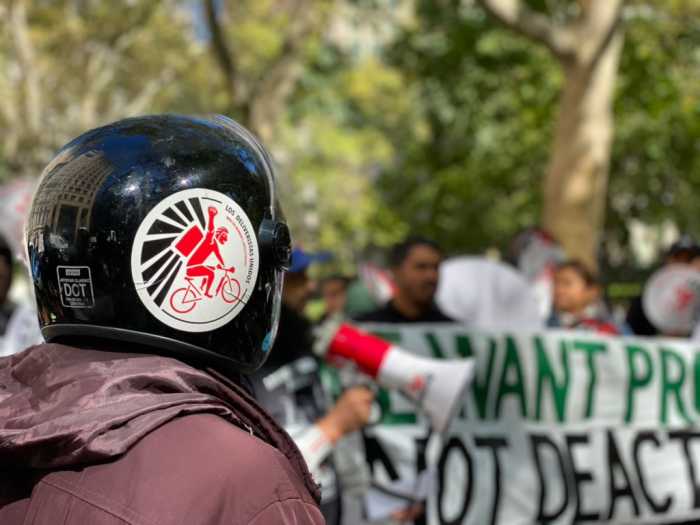
DoorDash raised similar concerns, telling the Council that the bill “could have unintended consequences for public safety,” as a 14-day notice requirement would make it more difficult to remove drivers engaged in unsafe behavior or fraud.
The company also objected to language requiring disclosure of consumer complaints, writing: “Absent any safeguards, this could be read to require that platforms share specific details of an incident with someone who has engaged in violence or assault. This information could easily be used by a bad actor to locate and retaliate against a consumer who submitted the complaint.”
Uber also opposed the measure, calling for a narrower definition of “deactivation.” The company testified that “a 14-day mandatory notice period before account termination would create significant fraud and safety risks” and that “sharing detailed consumer reports could enable workers to identify complainants, putting their safety at risk.”
Uber added that deactivation is “a measure of last resort, applied only when necessary to protect the integrity of the platform and the safety of the workers, consumers, and businesses who rely on it.”
All three companies stated that they support “fairness” and “due process,” but urged the council to consider other models, such as Colorado’s 2024 law, which requires warnings and appeals while still allowing immediate removal for serious misconduct.
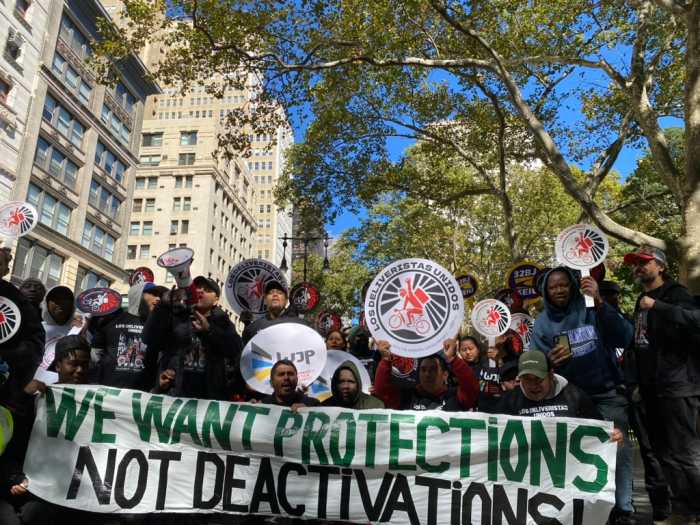
Guallpa told the committee that workers currently do not receive a termination notice right away, “they’re simply locked out of the app,” and that, usually several days later, they send an email that “just simply say, ‘you committed fraud’, but they don’t explain what kind of fraud, they don’t explain the reason, they don’t show documentation. And they don’t even give the opportunity for the worker to say, ‘Listen, I was delayed because there was traffic.’”
She also emphasized that the current system is not representative of the realities faced by many deliveristas, highlighting the deactivation of over a hundred Grubhub deliveristas, mostly from the Bangladeshi community, for logging into their accounts on multiple phones.
“What they don’t know is that deliveristas have to use two phones in order to work from 7 a.m. to midnight,” she said. “So, they lost their job for logging on to two phones, because the company didn’t know that deliveristas have to use two phones in order to work 12 hours a day.”



